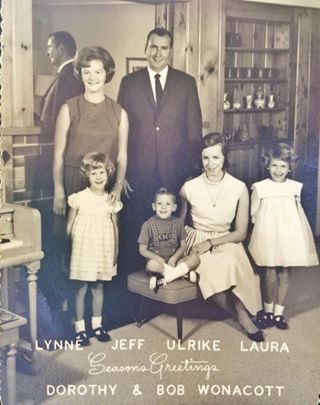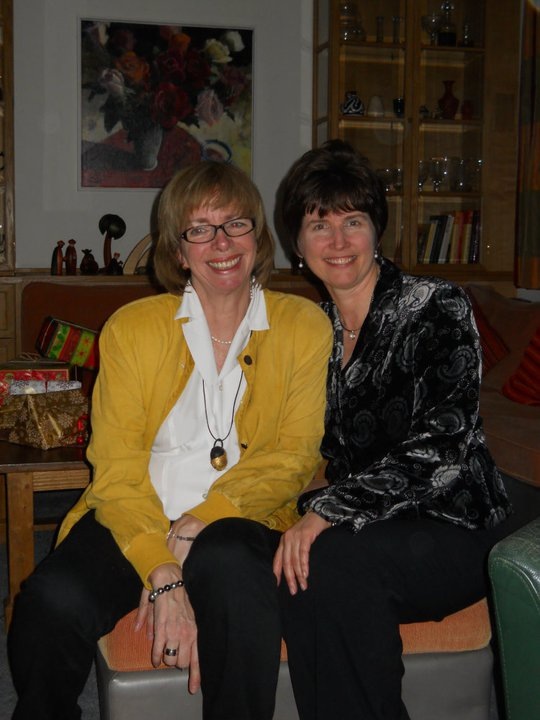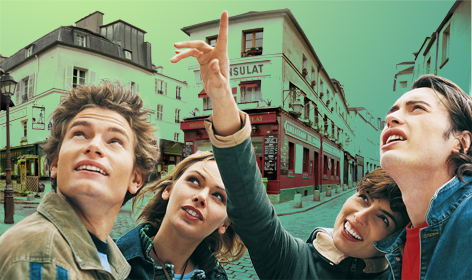I was raised in a white bread world, amongst the cherry trees and corn fields of Northern Michigan. In the 1960s, there was nothing global about Elk Rapids, a village of 1,200 where my grandmother’s grandparents had emigrated from Switzerland in the mid-1800s. My parents were well-educated—my father was a physician—but rarely traveled outside their state, much less the country. Still their sense of curiosity, generosity, respect, and hospitality made them the best kind of global citizens. And they were committed to opening the world to our family.

In 1967, the Wonacotts welcomed Ulrike, an exchange student from Bochum, Germany, into their family.
I remember like it was yesterday the day in 1967 when my parents first decided to invite an exchange student into our home. My father returned home from his medical practice, entering via the backdoor, which opened directly into the eat-in kitchen where my mother was making dinner. My younger sister and I were coloring at the kitchen table.
“I was at the conference meeting at the hospital this morning, and they mentioned that there was a German exchange student coming to Traverse City who wants to live with a doctor and his family for a year” he said. “I said I thought we could do it.”
My mother looked up from what she was doing. She looked at him for a moment and smiled. “Okay,” she said.
Though she didn’t know it then, the experience that followed would change my life forever.
About two weeks later, we set out in our station wagon on the four-hour journey to collect our exchange student at Detroit Metro Airport. I remember my father glancing alternately at the photo of our expected visitor and at the young women walking down the concourse. Suddenly he spotted her. “There she is!” he exclaimed. My sister and I ran to her, wrapping our arms around her waist from either side. ‘My new big sister,’ I thought. ‘All the way from Bochum, Germany!’ I could not have been more excited to meet her. We christened her “Uli,” because my 2-year-old brother Jeff couldn’t quite manage “Ulrike” (pronounced “Ool-ree-ka”). For all of us, it was love at first sight.
In my current work, I spend a lot of time thinking about how to encourage people to become good global citizens who engage with purpose around the world. In fact, I think first grade may be the best time to convert children into citizen diplomats, which is ironic, because six-year-olds are not really very diplomatic, in the usual sense of the word, and certainly not politically correct. At that age, their language is much more candid and unfiltered. Uli often came to ask me directly about things she didn’t understand, what they were called, how they were used.
With me, she knew she could always count on a straight answer. I wasn’t shy about asking her questions, either, tagging along at every opportunity. She told us stories we had never heard, sang new songs, made unusual foods, and shared German traditions with us. We especially loved the Advent calendar she made that December. But most importantly, she gave us a window to the world and a profound understanding that there was far more out there than we knew in our tiny corner of the American Midwest. We learned that different wasn’t necessarily about right and wrong; different could be right, fun, and good.
Uli lived with us for a year, during which time she graduated from our local high school and my youngest brother was born. Over the next twenty years or so, my parents hosted or facilitated the hosting of a dozen other students through various programs—from South America, Asia, Africa, Australia, and Europe. In turn, my parents traveled to visit them, and enabled their children’s international education and travel as well, encouraging us to visit our exchange ‘siblings’ and discover the world on our own.

Ulrike, affectionately referred to as “Uli” by the Wonacotts, and Laura developed a friendship that has lasted nearly five decades.
I called Uli as I was getting ready to write this post. I wanted to make sure that my memories matched hers. We had a wonderful conversation, reminiscing about our nearly half century friendship.
“When you lived with us, did you ever think the day would come that my children would hold your granddaughter?” I asked.
“No,” she laughed, and then grew serious. “But what I learned with your parents and your family was a different way of being with people, a much more easy-going and open way people in the U.S. got along with each other. For example, when you had a party, everyone helps in the kitchen after dinner, and you didn’t have to set the ‘perfect table.’”
She paused for a moment, remembering.
“In Germany, it was so much more formal, everything had to be done a certain way, which required a lot of work and preparation, and so we didn’t do it very often because it was so much work. Getting everyone together, having an open and friendly home, this is something that I have tried to carry with me in my life—to open my house, to accept everyone.”
The day Uli left is still clear in my mind. We had gone to my grandparents’ house for lunch after church. Afterwards, my aunt and uncle would drive her to New York, where she would board a ship with other European students who had spent the year in the U.S., and travel home.
I always knew that she would return to Germany. I knew that she could only stay with us a year. But at six-years-old, a year felt like an eternity. The reality that she would leave did not hit me until the moment the car pulled away from the curb. I ran down the sidewalk after the car, crying.
“You were on the outside of the car crying; I was on the inside of the car crying,” she said. “That was really terrible.” Forty-seven years later, we both choked up remembering that day.
Uli arrived just another German girl in the middle of Detroit. She left my big sister forever. Because of her experience, she maintained a commitment to student exchange throughout her life. She has been an exchange mom three times.
She sent her son to California as an exchange student through Youth for Understanding, an organization that has enabled the exchange of nearly 250,000 students who have gained skills and perspectives necessary to meet the challenges and benefits of the fast-changing global community, the same organization that helped her come to America so many years before.
He married a fellow Youth for Understanding alumna and together they have already hosted an exchange student. At this point, Uli is a glorified student exchange grandmother—and aunt.
It was natural—nearly a foregone conclusion—that my own life would cross borders. Because I was interested and curious about the world and its people, I pursued a career in international business. Before I knew there was such a thing as ‘global competence’—a requirement for the jobs of the 21st century—I was learning it at home.
My ability to interact across cultures gave me confidence socializing, working, problem-solving, and finding new ways to communicate with diverse colleagues and friends. My experiences from my earliest childhood informed that work.
Here are six lessons in citizen diplomacy I learned in first-grade. These continue to serve me well.
- Ask if you don’t understand something. Be curious, not judgmental, and never assume motive based on behavior. Encourage other people to ask, too.
- Explain using simple language. Give straight answers and explicit instructions, and explain why you are doing something and what your expectations are.
- Share your own story and your own traditions. It’s not only generous, it also makes you more mindful and appreciative.
- Listen The stories people share about their lives and families are one of the most important ways to learn, not only intellectually, but emotionally.
- Invite An open home is in and of itself generous hospitality, and creates the opportunity for deep and lasting bonds. There is rarely perfect timing. The unexpected guest—can be a great blessing.
- Love Though it’s rarely discussed in these terms, tolerance and mutual respect are actually ways of loving people. A six-year-old and a sixteen-year-old from different countries and different cultures can learn early on that it is possible to love people who are different from them.
Uli and Laura’s families continue to visit each other-whether on the shores of Lake Michigan and or in Germany.
Through the years, our friendship never waned. Uli and her husband Teddy came to visit periodically during our family’s summer vacations on the shores of Lake Michigan and we traveled to Germany to visit them several times over the years. In the summer of 2009, Uli and I sat together on the beach of Lake Michigan. “I always thought I would host an exchange student someday,” I said. “But the time never seemed right.”
My youngest daughter Caroline was about to enter her junior year of high school. Uli glanced over at me, smiled knowingly, and said: “If you’re ever going to do it, you’d better do it right now. There will never be a better time.”
I met her gaze, and our years of history as sisters and friends half way around the world rushed through my mind. And in that moment, I decided exactly what I would do next. I stood up, brushed the sand off my rear end, and headed back to the house to submit a YFU application. Three weeks later, we welcomed Dai Chuan—known to us as “Clark”—from Tian Jin, China. Clark was as excited as we were for his arrival in central Michigan.
At 16, he was the Bay City Central High School math star and a swim team stalwart. He was on time for school every single morning (which never rubbed off on his American sister, I’m sorry to say), and made many American friends. On the weekend before he returned to China, I cooked hamburgers for 90 teenagers who flooded our home to say good-bye and wish him well.
Clark is my only son and my daughters’ only brother. I hope to see the day he holds my daughters’ grandchildren, adding one more link to my family across borders.
Find out more about how you can host an international student through Youth for Understanding, a Citizen Diplomacy Network member organization.
Feature image credit: Youth For Understanding
Laura Asiala
Laura Asiala is the Vice President, Public Affairs at PYXERA Global. Passionate about the power of business to solve—or help solve—the world’s most intransigent problems, she leads the efforts to attract more participation of businesses to contribute to sustainable development through their people and their work. She also serves on the Board of Directors for Net Impact, a community of more than 40,000 student and professional leaders creating positive social and environmental change in the workplace.



this articles teachers us a lot of things in life which can model a young person into the real life. Life has a lot of challenges the way a person carry him/herself outside depends on the way a person was raise up.